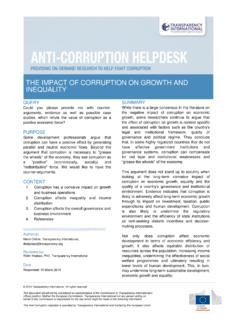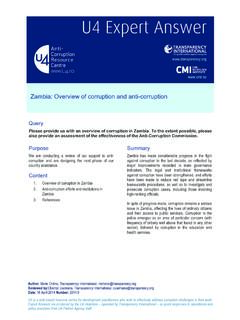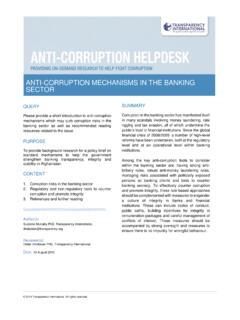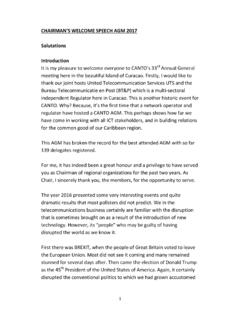Transcription of Influence of interest groups on policy-making
1 Author(s): Maira Martini, Transparency International, Reviewed by: Tinatin Ninua, Transparency International, and Robin Hodess , Transparency International, Date: 12 June 2012 Number: 335 U4 is a web-based resource centre for development practitioners who wish to effectively address corruption challenges in their work. Expert Answers are produced by the U4 Helpdesk operated by Transparency International as quick responses to operational and policy questions from U4 Partner Agency staff. Query Please provide an overview on the state of research on negative Influence of interest groups on decision-making - including state capture as well as their potential benefits, based on publicly available information and papers.
2 Particular reference should be given to South East Asia and East Asia including China. Identify factors which control and prevent interest groups from having a negative Influence on the governance and policy decisions in a country ( transparency, media, removal of discretion, ways of separating and ensuring conflicts of interest are avoided), providing examples/lessons learned from countries in the region which have curbed corruption/illegal Influence by interest groups whilst maintaining the (potential) benefits. Purpose There is increasing recognition of the emergence of new and pernicious interest groups which have Influence on policy making in Vietnam and distortions in the market.
3 We would like to help the Government understand better the nature and scenarios under which interest groups emerge and capture the state. They are also aware that there are some benefits and want to see if they can disentangle these. Regional evidence would be especially helpful. Content 1. interest group Influence on policy-making 2. Pros and cons of interest group Influence 3. Regulating interest group Influence 4. Best practice examples 5. References Caveat There is very little research on interest group Influence on policy-making and its potential benefits in Asian countries. Examples of best practices and lessons learned from these countries are also scarce.
4 Summary interest groups are associations of individuals or organisations that on the basis of one or more shared concerns, attempts to Influence public policy in its favour usually by lobbying members of the government. interest groups Influence on policy making is not a corrupt or illegitimate activity per se, but a key element of the decision-making process. However, disproportionate and opaque interest group Influence may lead to administrative corruption, undue Influence , and state capture, favouring particular interest groups at the expense of public interest . Transparency is thus key to ensure that policy-makers do not give preferential treatment for specific interest groups .
5 Regulations on lobbying, conflict of interest , asset Influence of interest groups on policy-making interest groups Influence on policy-making 2 disclosure, competition, as well as, on freedom of information are among the wide range of rules adopted by countries across the world to increase transparency and accountability in decision making. This answer thus provides for examples on measures taken by East and South-East Asian countries to increase transparency and accountability and avoid undue Influence and other forms of corruption, and best examples on regulating lobbying, focusing on the United States, Canada, and the European Union.
6 1 interest group Influence on policy-making Defining interest groups interest groups or special interest groups are any association of individual or organisations that on the basis of one or more shared concerns, attempt to Influence public policy in its favour usually by lobbying1 members of the government. interest groups may be classified according to their motivation: (i) economic, including individual corporations and business organisations; (ii) professional, including professional groups such as trade unions and farmers; (iii) public interest , including human rights groups , environmental groups , among others (Chari; Hogan; Murphy, 2010).
7 For the purposes of this query, we will focus on the Influence of economic interest groups . interest groups strategies and tactics interest groups may directly, or indirectly through consultants/ lawyers (the so-called professional lobbyists) seek to affect legislative action. These attempts to Influence policy-making may take place through different mechanisms, including direct communication with government officials, participation in public hearings, drafting reports to member of the government on specific policy issues, as well as through media comment (Chari, Hogan; Murphy, 2010). 1 The OECD (2008) describes lobbying as the existence of powerful interests corporate, private or other jurisdiction such as sub-national governments that makes efforts to Influence government decisions, in particular policy making, legislation or the award of contracts.
8 Such groups may also have different type of resources to Influence policy-making , such as campaign funding, expertise on policy issues, information on the opinion of other policy-makers (Dur; Bievre, 2007). 2 Pros and cons of interest group Influence interest groups Influence on policy making is not a corrupt or illegitimate activity per se, but a key element of the decision-making process (Zinnbauer, 2009). However, the advantages and disadvantages of interest group Influence will depend on how much power such interest groups have as well as on how power is distributed among them (Dur; Bievre, 2007) A disproportionate Influence of business groups , for example, can lead to undue Influence or even state capture.
9 In this context, the relationship between policy-makers and interest groups walk a fine ethical line that separates participatory democracy from undue Influence . Pros: potential benefits There is little evidence of the concrete benefits that could be brought by interest groups Influence on decision making. In general, interest groups may improve policy-making by providing valuable knowledge and insight data on specific issues. They also represent interests which may be negatively and involuntarily impacted by a poorly deliberated public policy (OECD, 2009). Moreover, as such groups keep track of legislative and regulatory processes, they also have an important role in holding government accountable (OECD, 2009).
10 In addition, Campos and Giovannoni (2008) have shown that in transition countries, interest group Influence through lobbying is found to be an alternative instrument of political Influence vis- -vis corruption. In this context, their findings are that lobbying, if adequately regulated, is a much more effective instrument than corruption for exerting political Influence and that lobbying is also a much stronger explanatory factor than corruption for firm performance. Previous studies have also shown that the extent of lobbying increases with income, and that firms belonging to a lobby group are significantly less likely to pay bribes.











